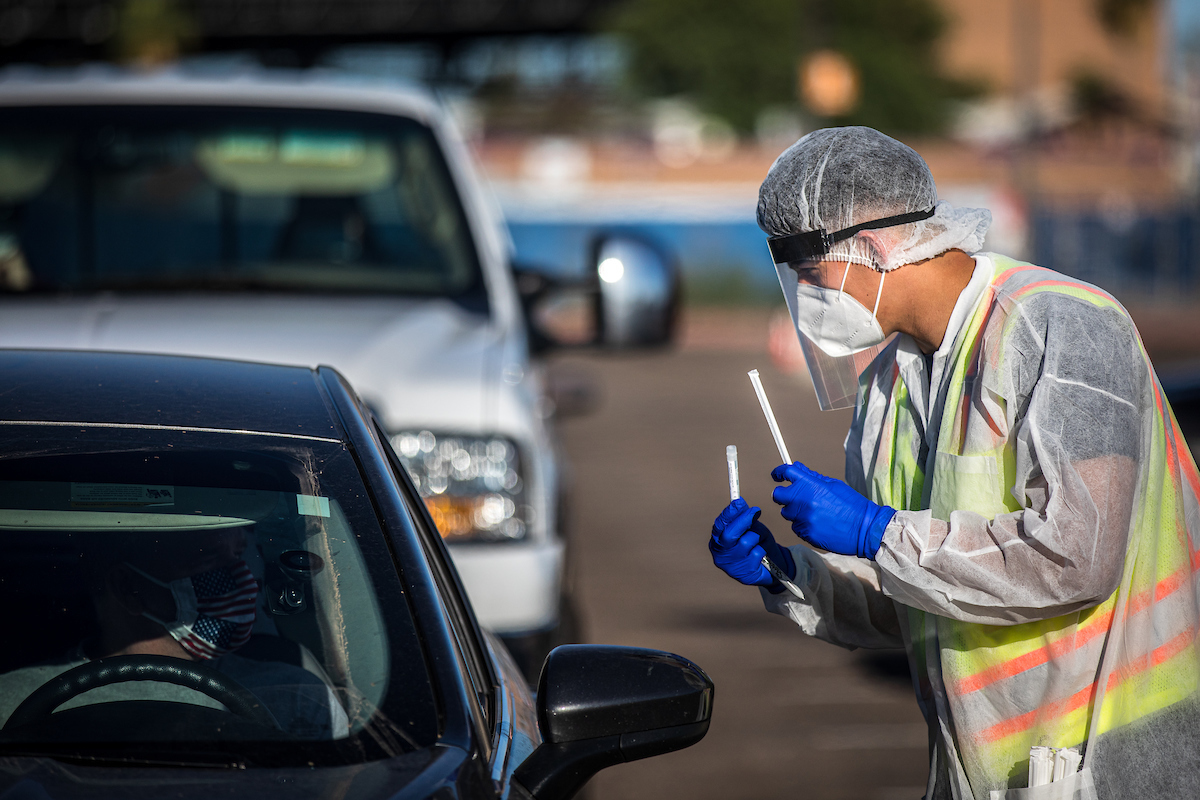A second wave of COVID-19 is rising in Arizona and across the U.S., causing exponential growth of new infections along with an increasing number of people hospitalized with the disease. Arizona is close to being in the same situation it was in during the summer — hospital beds and ICUs filling up and medical staff stretched thin.
With holiday gatherings, it’s likely to get even worse.
The Centers for Disease Control and Prevention and the Arizona Department of Health Services continue to urge the public to protect themselves and others by wearing masks at all times around people outside of your household, practicing physical distancing, washing your hands frequently and not gathering in groups.
This includes updated holiday recommendations not to gather with any people outside of your immediate household.
But there’s more you can do to help stop this current COVID-19 surge: Get tested.
Testing is proving to be one of the most effective tools we currently have to slow the spread of this dangerous and deadly disease. Testing sites, including many ASU saliva-based testing sites, are widely available throughout the state. ASU’s tests are free, and results are available typically within 48 hours. In addition, there are hundreds of other testing sites provided by clinics, health care centers and nonprofit organizations.
If I don’t feel sick, do I need to be tested?
Do you have a job where you’re regularly around different people (retail, food service, repair, hospitality, personal care, clinical care, etc.)? Do you socialize with people outside your immediate home, even if you’re doing so outdoors? Do you grocery shop in person, eat at restaurants (even on the patio), run errands or leave your home for other reasons? Have you traveled?
Then the answer is — “yes.”
Dr. Sue Pepin, managing director of ASU’s Health and Clinical Partnerships with ASU Knowledge Enterprise, is encouraging people throughout the state to be tested for COVID-19 — and to continue to be tested.
With tests now widely available, one promising way to help stop the spread of the virus is through assurance testing. This means testing people who are not necessarily showing any symptoms of COVID-19 but who have contact with people outside their immediate circle due to a public-facing job or activities like attending school.
What kinds of COVID-19 tests are available, and which should I take?
“There are two main types of testing currently being done: diagnostic testing and antibody testing. A diagnostic test will show whether you have an active COVID-19 infection and whether you should take steps to isolate yourself from other people,” said Pepin. “And while there are some false negatives, sometimes because a person has been tested too early, this test serves as an assurance that right then, you are or are not infectious. The types of diagnostic tests include molecular (PCR and LAMP) tests that detect the virus’s genetic material, and antigen tests that detect specific proteins on the surface of the virus.
“There’s also antibody testing, which can tell you whether you’ve had a past COVID-19 infection. Antibodies can take days or weeks to show up in your blood. This test is not used to show whether you have an active infection, but it does inform us about where the virus has spread and can help determine public health measures.”
To help stop the current spread of COVID-19, Pepin recommends taking either the saliva-based or nasopharyngeal PCR test.
Who should be tested for the virus, and how often?
“I would like to see as many people as possible throughout the state continue to get tested if they have any reason to be tested,” said Dr. Joshua LaBaer, executive director of the Biodesign Institute at ASU. “If you’ve been out in a group and you know someone was positive in the group, if you have a job that involves facing the public on a daily basis or facing new people every day, if you are in rooms with people that you are not normally with and later heard that someone was sick in the room, get tested. The more we identify cases, the quicker we’ll be able to get this under control. This is especially critical right now, as cases are surging to levels we have not seen since this summer.”
LaBaer’s lab developed a saliva-based COVID-19 diagnostic test to make testing easier and more readily available to Arizonans. Through regular, ongoing testing of its population, Arizona will be better equipped to gauge what is happening with the virus, dtermine where hot spots are and mitigate further spread.
“This virus is widespread, getting worse and spreading quickly because we have let our guard down,” said LaBaer. “It’s just biological material with a biological imperative to move from body to body. Now, the key is increasing our vigilance, maintaining mitigating practices that we’ve done in the past, continuing to get tested and chasing the numbers down. We are at a critical point in Arizona and across the U.S. Now is the time to act. We cannot let up.”
Testing in underserved communities
Increasing the number of people getting tested, as well as supporting underserved communities with testing through a coordinated network, can help.
“We are coordinating testing capacity by establishing a network in the state, between university, county, state and other labs, and by increasing our efforts to provide testing to underserved and remote populations,” said Pepin. “We can connect the testing capacity to increased contact tracing capacity and work on support services for isolation needs.”
What are the different types of testing? How and why are they used?
>>Explore the types of tests with this chart.
You may have read about a wide variety of testing types. Each one serves a slightly different purpose, but all play an important part in slowing and halting the spread of COVID-19.
Types of diagnostic tests
PCR testing (saliva or nasal swab): This medical test is intended to identify the occurrence of disease at the individual level when there is reason to suspect a person may be infected. The person may have symptoms or have been exposed to someone with COVID-19.
Antigen testing (nasal swab): This is the fastest diagnostic test, but it is not highly accurate and it’s more likely to produce false negative results. This is most useful for screening groups of people in settings where rapid or repeated testing is needed. Antigen tests are not recommended for people without symptoms who haven’t been exposed to a COVID-19 patient.
LAMP testing (nasal swab): This rapid, at-home diagnostic test is similar to PCR, but may be less accurate and either miss some people who are positive or show false positives. LAMP stands for “loop-mediated amplification reaction” test. It detects genetic material from the coronavirus using a nasal swab. It is available by prescription only.
Antibody testing and monitoring the spread of the disease
Antibody (serology) testing: This blood test tells you if you had COVID-19 in the past. This is not a diagnostic test. Do not use it to detect a current infection.
Assurance testing: This type of test is used to identify disease occurrence at the individual level even if the person has no symptoms. This type of testing requires far greater scale than medical testing.
Surveillance testing: This type of testing is intended to monitor for the disease at the community or population level. Repeat testing is a similar tool.
Pooled testing: By pooling samples, testing can be scaled up while at less cost and with fewer resources. All of the samples are combined in a single pool, which is tested once. If a pooled test is negative, all samples that were pooled can be presumed to be negative. If the result is positive, then all specimens in the pool need to be individually retested. The pool size is adjusted according to the community prevalence of the virus. This method works better with lower positivity rates, such as 1% to 2%.
Where can I get tested?
A central part of ASU’s commitment to be of service to the wider community and to its student and employee populations is access to COVID-19 testing. ASU is offering saliva-based testing at no cost to students, employees and the wider Arizona public thanks in part to support by the Arizona Department of Health Services. These tests are offered free of charge for both symptomatic and asymptomatic individuals.
>>Book a saliva-based COVID-19 test.
In addition, there are hundreds of other testing sites provided by clinics, health care centers and nonprofit organizations. Some of these are also free of charge. More information on testing sites.




